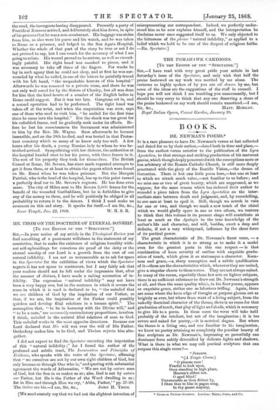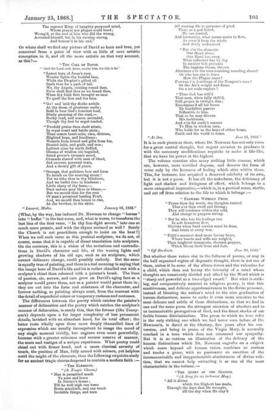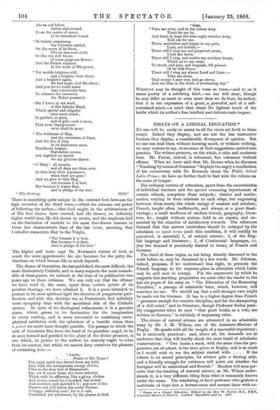BOOKS.
DR. NEWMAN'S POEMS.*
IT is a rare pleasure to have Dr. Newman's verses at last collected and dated for us by their author,—dated both in time and place,— from the earliest verses anterior to the publication of the Lyra Apostolica, to that strange and striking production of his maturest genius, which though deeply penetrated with the conceptions more or less arbitrary of the Roman Catholic Church, is still more deeply penetrated with the glory of the Beatific Vision,—the dream of Gerontius. There is but one little poem here,—but one at least to which we attach much value,—not familiar to us before ; and we miss one or two of great beauty, which are suppressed, as we suppose, for the same reason which has induced their author to remodel a piece taken from the Lyra Apostolica on the inter- mediate state between death and judgment, and, by remodelling, to our ears at least to spoil it. Still, though we search in vain for one or two, and though we mark a new touch of the chisel which we would gladly spare in one or two others, we venture to think that this volume in its present shape will contribute at least as much as the Apologia to the true knowledge of the author's life and character, and will, besides, exert a deep and definite, if not a very widespread, influence by the sheer force of its poetical power.
The great characteristic of Dr. Newman's finest verso, — a characteristic in which it is so strong as to make it a model even for the greatest poets in this one respect — is that combination of keen severity of outline with exquisite gradu- ation of touch, which gives it so statuesque a character. Keen- ness and grace,—a. sharp conception and a subtle qualification of it—these are the characteristics which, wherever they are united, give a singular charm to these verses. They are not always united. In many of the verses, especially those few sets on lighter subjects, there is no sufficient substance to draw out Dr. Newman's strength at all, and then the same quality which, in his finer poems, appears as exquisite grace, strikes one as laborious trifling. Again, there are some where the keen edge of thought or purpose gleams out as brightly as ever, but where from want of a living subject, from the nakedly doctrinal character of the theme, there is no room for that graduation of touch, that play of light and shade, which is necessary to give life to a poem. In these cases the verse will take hold probably of the intellect, but not of the imagination ; it is too severe and naked for poetry,—it is metrical dogma. But where the theme is a living one, and one familiar to his imagination, we know no poetry attaining so completely the peculiar beauty of fine sculpture as Dr. Newman's, impressing so powerfully one dominant form subtly diversified by delicate lights and shadows. What is there in what we may call poetical sculpture that can surpass this single verse ?—
" JUDAISM.
"(A Tragic Chorus.)
" 0 piteous race!
Fearful to look upon, Once standing in high place, Heaven's eldest son.
0 aged blind!
Unvenerable as thou flittest by, I liken thee to him in pagan song, In thy gaunt majesty,
• Verses on Various Oecaskns. London: HOrns, Oates, and Co.
The vagrant King, of haughty-purposed mind, Whom prayer nor plague could bend ; Wrong'd, at the cost of him who did the wrong, Accursed himself, but in his cursing strong,
And honour'd in his end."
Or where shall we find any picture of David so keen and true, yet conceived from a point of view with so little of mere artistic conception in it, and all the more artistic on that very account, as this?—
" THE CALL OF DAVID.
" And the Lord said, Arise, anoint him, for this is he.'
"Latest born of Jesse's race, Wonder lights thy bashful face, While the Prophet's gifted oil Seals thee for a path of toil. We, thy Angels, circling round thee, Ne'er shall find thee as we found thee, When thy faith first brought us near To quell the lion and the bear.
" Go ! and 'mid thy flocks awhile At thy doom of greatness smile ; Bold to bear God's heaviest load, Dimly guessing of the road,— Rocky road, and scarce ascended, Though thy foot be angel-tended.
"Twofold praise thou shalt attain, In royal court and battle plain ; Then comes heart-ache, care, distress, Blighted hope, and loneliness; Wounds from friend and gifts from foe, Dizzied faith, and guilt, and woe ; Loftiest aims by earth defiled, Gleams of wisdom sin-beguiled, Sated power's tyrannic mood, Counsels shared with men of blood, Sad success, parental tears, And a dreary gift of years.
"Strange, that guileless face and form To lavish on the scarring storm ! Yet we take thee in thy blindness, And we buffet thee in kindness ; Little chary of thy fame,—
Dust unborn may bless or blame,— But we mould thee for the root Of man's promised healing Fruit, And. we mould thee hence to rise, As our brother, to the skies.
" Lazaret, Malta. January 18, 1833."
(What, by the way, has induced Dr. Newman to change " harass" into " buffet " in the last verse, and, what is worse, to transform the last line of the first verse, " In thy lion-fight severe," into one so much more prosaic, and with the rhyme maimed as well ? Surely the Church is not punctilious enough to insist on the bear ?) When we call such verse as this poetical sculpture, we do not, of course, mean that it is capable of direct translation into sculpture.
On the contrary, this is a vision of the mutations and contradic- tions in David's character and life, of the waning lights and growing shadows of his old age, such as no sculpture, which cannot delineate change, could possibly embody. But the same is equally true of painting, and there is a real meaning in saying that the image here of David's life and lot is rather chiselled out with a sculptor's chisel than coloured with a painter's brush. The lines of passion, sin, sorrow, and care grow on David's aging face as a sculptor would grave them, not as a painter would paint them in ; they are cut into the form and substance of the character, and borrow nothing, as painting always must, from the contrast with the detail of superficial colour or temporary customs and costumes.
The differences between the poetry which catches the painter's manner of delineation and the poetry which catches the sculptor's manner of delineation, is surely this, that the former (like Tenny- son's) depends upon a far larger complexity of less permanent details, lavished with an abundant hand, for its total effect ; the latter rests wholly upon those more deeply channelled lines of expression which are usually incompetent to image the mood of any single moment vividly, but engrave even more powerfully, because with a greater reticence and severer reserve of manner, the scars and vestiges of a unique experience. What poetry could chisel out with firmer hand, and a more classical severity of touch, the position of Man, fully armed with science, yet helpless amid the might of the elements, than the following exquisite study
for an ancient tragic chorus deepened to contain a modern faith :- " THE ELEMENTS.
" (A. Tragic Chorus.)
"Man is permitted much To scan and learn In Nature's frame ;
Till he well nigh can tame Brute mischiefs, and can touch Invisible things, and turn All warring ills to purposes of good.
Thus, as a god below, He can control,
And harmonize, what seems amiss to flow, As sever'd from the whole And dimly understood.
"But o'er the elements One Hand alone, One Hand has sway. What influence day by day In straiter belt prevents The impious Ocean, thrown Alternate o'er the over-sounding sounding shore?
Or who has eye to trace How the Plague came?
Forerun no doublings of the Tempest's race ?
Or the Air's weight and flame On a set scale explore ?
"Thus God has will'd That man, when fully skill'd, Still gropes in twilight dim ; Encompass'd all his hours By fearfnllest powers Inflexible to him.
That so he may discern His feebleness, And e'en for earth's success To Him in wisdom turn, Who holds for us the keys of either home, Earth and the world to come.
"At Sea. June 25, 1833."
It is in such pieces as these, where Dr. Newman has not only room for a great central thought, but urgent occasion to graduate it with the necessary modifications requisite to make it life-like, that we have his power at the highest.
The volume contains also many striking little stanzas, which are, however, mere versified dogmas, and deserve the form of verse only by the keenness of feeling which stirs within them. This, for instance, has acquired a deserved celebrity of its own, but it is not a poem. It has all the nakedness, the deficiency of light and shadow and livingness of effect, which belongs to a mere categorical imperative,—which is, in a poetical sense, sterile, and cut off from relation to the life to which it belongs :—
" FLOWERS WITHOUT FRUIT.
"Prune thou thy words, the thoughts control That o'er thee swell and throng; They will condense within thy soul, And change to purpose strong.
" But he who lets his feelings run In soft luxurious flow, Shrinks when hard service must be done, And faints at every woe.
" Faith's meanest deed more favour bears, Where hearts and wills are weigh'd, Than brightest transports, choicest prayers, Which bloom their hour and fade.
" Of Sardinia. June 20, 1833."
But whether these verses rise to the fullness of poems, or stay in the half organized region of dogmatic thought, there is not one of
them, unless it be some of the album verses and the valentine for a child, which does not betray the intensity of a mind whose thoughts are consciously divided and sifted by the Word which is "sharp and powerful as a two-edged sword." But what is strik- ing, and comparatively unusual in religious poetry, is that this sensitiveness, and delicate apprehensiveness to the divine presence, .
instead of blunting the author's mind to the nice graduation of human distinctions, seems to make it even more sensitive to the most delicate and subtle of these distinctions, so that we find in
one and the same poem the strongest assertion of absolute and to us inconceivable prerogatives of God, and the finest shades of our feeble human discrimination. The poem to which we here refer is the only striking one which we had never seen before of Dr. Newman's, is dated at the Oratory, five years after his con version, and being in praise of the Virgin Mary, is naturally
couched in a tone which does not command our sympathy.
But it is so curious an illustration of the delicacy of the human distinctions which Dr. Newman engrafts on a subject which soars beyond all human vision, combines so curious and tender a grace, with so passionate an assertion of the incommunicable and inapprehensible absoluteness of divine voli- tion, that we cannot help extracting it as one of the most characteristic in the volume :—
"THE QUEEN OF THE SEASONS.
"(A Song for an inclement May.) " All is divine which the Highest has made, Through the days that He wrought, till the day when Ho stay'd Above and below, within and around, From the centre of space, to its uttermost bound.
"In beauty surpassing the Universe smiled, On the morn of its birth, like an innocent child, Or like the rich bloom of some gorgeous flower ; And the Father rejoiced in the work of His power.
"Yet worlds brighter still, and a brighter than those, And a brighter again, He had made, had He chose ; And you never could name that conceivable best, To exhaust the resources the Maker possess'd.
"But I know of one work of His Infinite Hand,
Which special and singular
over must stand ; So perfect, so pare, and of gifts such a store, That even Omnipotence ne'er shall do more.
" The freshness of May, and the sweetness of June, And the fire of July in its passionate noon, Munificent August, September serene, Are together no match for my glorious Queen.
" 0 Mary ! all months and all days are thine own, In thee lasts their joyousness, when they are gone!
And we give to thee May, not because it is best, But because it comes first, and is pledge of the rest.
"The Oratory.
1850."
There is something quite unique in the contrast here between the high assertion of the third verse,—which far outsoars our power of following the author,—that God might, in the arbitrariness of of His free choice, have created, had He chosen, an infinitely higher world than He did choose to create, and the emphasis laid on the limitation of mortals to the most fine-drawn reasons in those last characteristic lines of the last verse, asserting that Catholics consecrate May to the Virgin,
"Not because it is best, But because it is first, And is pledge of the rest."
The higher and more rapt Dr. Newman's visions of God, so much the more apprehensive his eye becomes for the petty dis- tinctions on which human life so much depends.
The dream of Gerontius, the last published, the moat difficult, the most distinctively Catholic, and in many respects the most remark- able of these poems, we noticed at the time of its publication two years ago in these columns. We can only say that the oftener we have read it, the more, apart from certain points of its peculiar theology, we have admired it. It is a poem intended to present in its most spiritual light the doctrine of purgatorial puri- fication, and with this doctrine we, as Protestants, feel infinitely more sympathy than with the sacerdotal side of the Catholic system. In spite of its theological refinements, it is a genuine poem, which grows in its fascination for the imagination at every reading, and is more successful in combining meta- physical subtleties with the splendour of a beatific vision than a priori we could have thought possible. The passage in which the soul of Gerontius flies from the hand of its guardian angel, to be at once burned and purified in the glory of the divine presence, is one which, in justice to the author, we scarcely ought to sever from its context, but which we cannot deny ourselves the pleasure of extracting here :—
"ANGEL.
LI Praise to His Name !
The eager spirit has darted from my hold, And, with the intemperate energy of love, Flies to the dear feet of Emmanuel; But, ere it reach them, the keen sanctity, Which with its effluence, like a glory, clothes And circles round the Crucified, has seized, And scorch'd, and shrivell'd it ; and now it lies Passive and still before the awful Throne. 0 happy, suffering soul ! for it is safe, Consumed, yet quickened, by the glance of God.
som
"Take me away, and in the lowest deep There let me be, And there in hope the lone night-watches keep, Told out for me.
There, motionless and happy in my pain,
Lone, not forlorn,—
There will I sing my sad perpetual strain, Until the morn.
There will I sing, and soothe my stricken breast, Which ne'er can cease To throb, and pine, and languish, till possest Of its Sole Peace.
There will I sing my absent Lord and Love:—
Take me away, That sooner I may rise, and go above, And see Him in the truth of everlasting day."
Whatever may be thought of this verse as verse,—and to us it seems poetry of a subduing kind,—no one will deny, though he may differ as much or even more than we do from its author, that it is the expression of a great, a powerful, and of a self- restrained mind,—a mind that obeys the lightest touch of the bridle which its author's fine intellect and delicate taste impose.
































 Previous page
Previous page